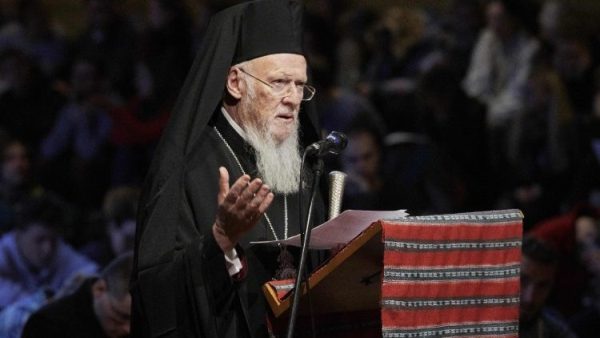Halki Summit IV: Focus on Covid-19 and Climate Change
 “Halki Summit IV” takes place in a virtual format on the theme: “COVID-19 and Climate Change”.
“Halki Summit IV” takes place in a virtual format on the theme: “COVID-19 and Climate Change”.
The Ecumenical Patriarchate of Constantinople is organizing its fourth ecological “Halki Summit”, gathering activists, scientists, journalists, business leaders, theologians and academics of different Countries and faiths to promote global awareness on the consequences of climate change, but also to discern and effect changes in values and social attitudes related to the abuse of God’s creation.
Lessons learnt from global crisis
The Summit, which draws its name from the Turkish island of Halki (Heybeliada), will gather from January 26 to January 28 in a virtual format, due to the Coronavirus pandemic and will be focused on the theme: “COVID-19 and Climate Change: Living with and Learning from a Pandemic”. Participants will be discussing the lessons that we have learned for this global crisis, its impact on nature and the environment, its implications for healthcare and how it has changed our approach to science.
Ecumenical Patriarch of Constantinople
The first webinar will be introduced by the Ecumenical Patriarch of Constantinople, H.B. Bartholomew I, and will focus on our failed relationship with nature, pointing out the strong connection between the present health crisis and the ecological crisis, namely THE loss of wildlife and natural habitats and climate change. Speakers will examine what we have learned and what we have yet to learn about this pandemic and how the social, economic, and ecological impacts can be mitigated.
On the second day participants will discuss the impact of COVID-19 on the relationship between politics and science and religion and science, which has often been difficult. They will examine how governments and churches have responded to scientists and the science on Covid-19 and how the new Coronavirus has affected science and technology, as well as our perception of science and religion. The discussion will be introduced by Metropolitan John of Pergamon.
Finally, on January 28 the Summit will focus on the implications of the pandemic for health. As the novel Coronavirus affects the lives of millions of people throughout the globe, rising above national boundaries and racial differences, it has invariably left an indelible mark on matters of public health and mental health. Participants will therefore discuss the importance of coordination and cooperation, of mandatory lockdowns and social distancing, as well as of leadership and support, but also what is the trade-off between health and economy and the appropriate response to the need to care for people.
History of the Halki Summit
The first “Halki Summit” was held in June 2012 and focused on the theme of “Global Responsibility and Environmental Sustainability”. “Halki Summit II”, in 2015, brought together experts from around the world on the theme: “Theology, Ecology, and the Word: a Conversation on the Environment, Literature and the Arts.” “Halki Summit III”, in 2019, gathered scholars and students from theological schools and seminaries all over the world to discuss “Theological Formation and Ecological Awareness”.
The Summits are inspired by a series of international, interfaith and interdisciplinary environmental symposia organized since 1995 in various Countries under the auspices of the Patriarch of Constantinople Bartholomew, who over the last decades has advocated and advanced worldwide conversation and cooperation among representatives of various disciplines and faiths on environmental issues. At the heart of this discussion is the belief that no effort can be successful without a fundamental change in values as manifested in ethics, spirituality and religion.
H. B. Bartholomew has been encouraged by his predecessor Dimitrios, who in 1989 established the Day of Prayer for the protection and conservation of the natural environment. The Orthodox Church was subsequently followed by the Conference of the European Churches and the World Council of Churches and, more recently, by Pope Francis whose Encyclical “Laudato sì” was also inspired by the ecological initiatives of Patriarch Bartholomew.
Lisa Zengarini
Source: vaticannews.va

